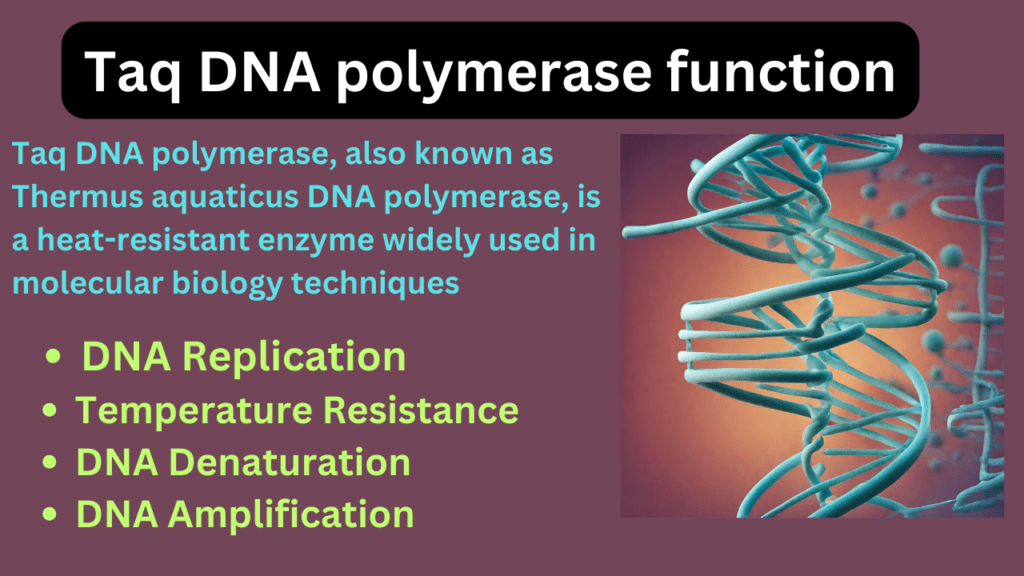Taq DNA polymerase, also known as Thermus aquaticus DNA polymerase, is a heat-resistant enzyme widely used in molecular biology techniques, particularly in the polymerase chain reaction (PCR). PCR is a method for amplifying DNA. Taq DNA polymerase is a key component of the PCR process.

The unique feature of Taq DNA polymerase is its ability to withstand the high temperatures involved in the PCR process. It was originally isolated from the bacterium Thermus aquaticus, which inhabits hot springs and other extreme environments.
Taq polymerase is active at the high temperatures required for PCR, typically around 72-75 degrees Celsius (162-167 degrees Fahrenheit), which is necessary to denature the DNA strands and replicate the target DNA sequence.
Taq polymerase has limitations, such as a lack of 3′ to 5′ exonuclease proofreading activity, which means it is more prone to introducing errors during DNA replication compared to other DNA polymerases. However, its stability at high temperatures makes it an essential tool in molecular biology laboratories for routine PCR procedures.
For applications where high-fidelity DNA replication is crucial, such as DNA sequencing, researchers may use other DNA polymerases with proofreading capabilities, which can correct errors during DNA synthesis.
Taq DNA polymerase function
Here are the Taq DNA polymerase functions
- DNA Replication: Taq DNA polymerase is used to synthesize new DNA strands during the polymerase chain reaction (PCR) by adding complementary nucleotides to the DNA template.
- Temperature Resistance: It can withstand high temperatures (approximately 72-75°C) without becoming denatured, making it suitable for PCR, which involves repeated cycles of heating and cooling.
- DNA Denaturation: Taq polymerase helps separate the two DNA strands by catalyzing the melting of the DNA at high temperatures, allowing for the amplification of specific DNA sequences.
- DNA Amplification: It amplifies the target DNA sequence in a PCR reaction, resulting in millions of copies of the desired DNA fragment.
- Replication of Short DNA Fragments: Taq DNA polymerase is particularly effective in replicating relatively short DNA fragments, typically under 5 kilobases in length.
- Primer Extension: It extends DNA primers by adding nucleotides to their 3′ ends during PCR, which is a critical step in DNA replication.
- Molecular Biology Research: Taq DNA polymerase is widely used in molecular biology research, genetic testing, and various DNA-based applications.
- Enzyme Stability: It remains active over multiple cycles of heating and cooling, which is essential for the repetitive temperature cycling in PCR.
- Lack of Proofreading: Taq polymerase lacks 3′ to 5′ exonuclease activity, making it less accurate than some other DNA polymerases, but this characteristic is suitable for certain applications.
- Cloning: Taq DNA polymerase is often used in cloning DNA fragments, where the primary requirement is efficient DNA amplification.
Why is it important that taq dna polymerase is heat-stable?
The heat stability of Taq DNA polymerase is critically important for its use in polymerase chain reaction (PCR) and various DNA amplification techniques for several reasons:
- DNA Denaturation: PCR requires the denaturation of DNA, where the double-stranded DNA template is heated to a high temperature (usually 94-98°C) to separate the two DNA strands. Taq DNA polymerase’s heat stability allows it to remain active during this denaturation step, ensuring that the DNA strands are effectively separated.
- Enzyme Activity: Most enzymes, including DNA polymerases, denature and become inactive at high temperatures. Taq DNA polymerase’s ability to withstand these high temperatures (around 72-75°C) is essential because it allows the enzyme to function during the extension step of PCR when new DNA strands are synthesized.
- Repetitive Cycling: PCR involves multiple temperature cycles, including denaturation, annealing, and extension steps. The heat stability of Taq polymerase ensures that the enzyme remains active throughout these cycles, which is necessary for the repeated amplification of the target DNA.
- Efficiency: Taq DNA polymerase’s heat stability simplifies the PCR process, as there’s no need to add fresh enzyme after each denaturation step. This reduces the risk of contamination and makes the PCR process more efficient.
- Cost-Effectiveness: Since Taq polymerase can withstand multiple heating and cooling cycles, it can be more cost-effective for high-throughput experiments, as it reduces the need for frequent enzyme replenishment.
- Versatility: The heat stability of Taq DNA polymerase also makes it suitable for other DNA amplification applications that involve high-temperature conditions, such as DNA sequencing and DNA labeling.
why do we use taq dna polymerase in pcr instead of some other DNA polymerase?
Taq DNA polymerase is commonly used in PCR (polymerase chain reaction) for several specific reasons that make it particularly well-suited for this application:
- Heat Resistance: Taq DNA polymerase is derived from the thermophilic bacterium Thermus aquaticus, which thrives in hot springs. This enzyme is heat-stable and remains active at high temperatures, around 72-75°C. This property is crucial in PCR, where the DNA strands need to be denatured by high temperatures during each cycle. Other DNA polymerases, which are not as heat-stable, would become denatured and lose activity under these conditions.
- Simplicity: Taq polymerase’s heat stability simplifies the PCR process. Researchers don’t need to replenish the enzyme after each denaturation step. This reduces the risk of contamination and streamlines the experimental procedure.
- Cost-Effectiveness: Because Taq polymerase can endure multiple heating and cooling cycles, it is more cost-effective for high-throughput experiments, as it eliminates the need for frequent enzyme additions.
- Convenience: The ability to work at high temperatures reduces the likelihood of non-specific binding or mispriming, which can occur at lower annealing temperatures with some other DNA polymerases. This leads to cleaner and more specific PCR products.
- Robustness: Taq DNA polymerase is relatively robust and works well with a variety of PCR buffers and reaction conditions, making it suitable for a broad range of applications.